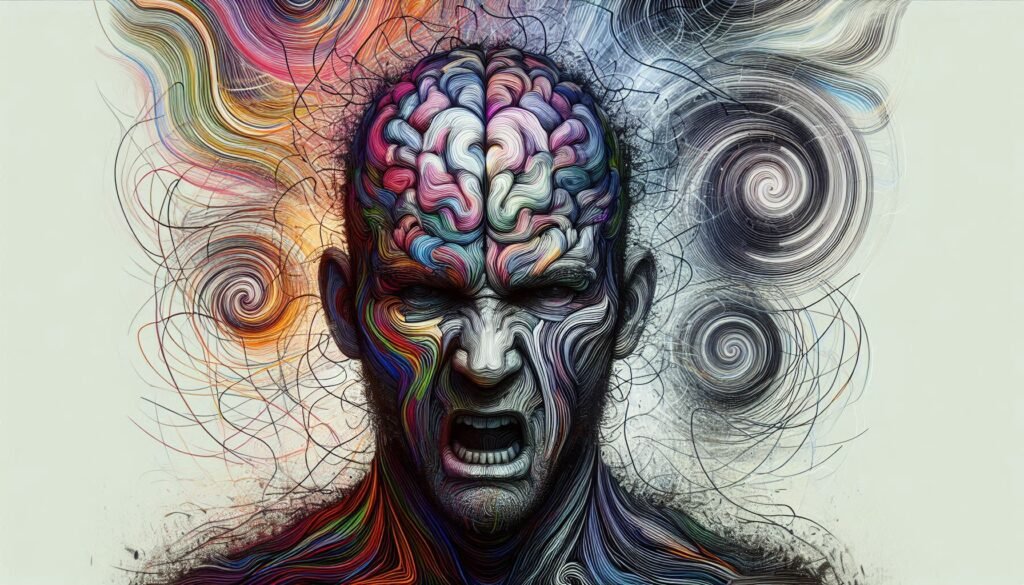A concussion can be a game-changer, but not just for athletes. The effects often extend beyond physical symptoms, delving into the realm of emotional health. Many individuals who experience concussions report heightened irritability and emotional lability—unexpected mood swings that can disrupt daily life. Understanding these changes is crucial for recovery and well-being.
If you or someone you know has faced this challenge, you’re not alone. Mood alterations following head trauma are more common than many realize. This blog will explore the neurological basis behind these shifts in emotions, how to identify them, and effective strategies for coping with irritability and emotional instability post-concussion. Navigating through this uncharted territory may seem daunting, but with proper awareness and support, it’s possible to find balance again after injury. Let’s dive deeper into understanding these vital aspects of concussion recovery together!

Understanding Emotional Dysregulation Following Concussion
Emotional dysregulation is a common yet often overlooked consequence of concussion. This phenomenon refers to difficulty in managing one’s emotional responses, leading to unexpected feelings and reactions. Individuals may experience intense irritability or mood swings that seem disproportionate to the situation.
Following a concussion, changes in brain function can disrupt the neural pathways responsible for emotion regulation. Areas such as the prefrontal cortex and limbic system play crucial roles in processing emotions, and any trauma can impair their effectiveness. As these regions struggle to communicate properly, emotional responses may become unpredictable.
Many who suffer from this condition find it challenging to maintain relationships and navigate social situations due to overwhelming feelings. Simple interactions can lead to frustration or anger that feels unmanageable, resulting in isolation.
Understanding the roots of emotional dysregulation post-concussion is essential for recovery. Identifying these patterns allows individuals and caregivers alike to develop strategies tailored towards improving emotional stability during rehabilitation.
Neurological Basis of Irritability and Mood Swings After Head Trauma
Head trauma impacts the brain’s delicate balance of neurotransmitters, leading to irritability and mood swings. Concussions can disrupt the function of serotonin, dopamine, and norepinephrine—key players in emotional regulation. When these chemicals are out of sync, individuals may experience heightened emotions or sudden shifts in mood.
The prefrontal cortex also plays a crucial role in managing impulses and decision-making. Damage to this area from a concussion can reduce one’s ability to control feelings effectively. This impairment often results in frustration or anger over minor issues.
Additionally, connections between various brain regions become compromised after injury. The limbic system, responsible for emotional responses, may not communicate efficiently with other areas that regulate behavior. This disconnection contributes significantly to experiences of emotional lability.
Inflammation caused by head trauma further complicates matters. It affects neuronal health and communication pathways within the brain, amplifying symptoms like irritability and mood fluctuations that many patients struggle with post-concussion.
Recognizing Signs of Emotional Lability in Concussion Patients
Emotional lability can manifest in various ways following a concussion. Patients may experience sudden outbursts of anger, crying, or laughter that seem disproportionate to the situation. These mood swings often occur without warning and can leave both the individual and their loved ones feeling confused.
Another sign is heightened sensitivity to emotional stimuli. A minor comment or event might provoke an intense reaction. Individuals may find themselves feeling overwhelmed by emotions they cannot control. This unpredictability can be distressing for those experiencing it.
Additionally, irritability becomes a common symptom in this context. Patients might react more negatively than usual towards everyday stressors, leading to conflicts with friends and family members. Recognizing these changes early on is crucial for effective management.
It’s also important to note that some patients may withdraw socially due to fear of how they will react emotionally in public settings. Understanding these signs helps guide conversations about emotional health post-concussion, paving the way for appropriate support strategies.
Impact on Relationships and Social Functioning
Irritability and emotional lability post-concussion can profoundly affect relationships. Mood swings may lead to misunderstandings with loved ones, creating distance where there once was closeness. Friends and family might struggle to comprehend the sudden changes, leading to frustration on both sides.
Social functioning also suffers as individuals may withdraw from activities they once enjoyed. Fear of an outburst or emotional breakdown can make social situations daunting. This avoidance can exacerbate feelings of isolation, further impacting mental health.
Communication becomes challenging as patients grapple with fluctuating emotions. Expressing needs or concerns often takes a backseat when mood instability reigns supreme. The inability to articulate oneself clearly can cause additional strain in personal connections.
As these challenges unfold, support systems must adapt. Educating friends and family about the effects of concussions is essential for fostering understanding and patience during this difficult time. An informed network helps create a nurturing environment conducive to recovery.
Differentiating Post-Concussion Mood Changes from Other Psychiatric Conditions
Post-concussion mood changes can often mimic symptoms seen in various psychiatric conditions. It’s essential to recognize these differences for effective treatment. Irritability and emotional lability post-concussion may arise suddenly after the injury, whereas other psychiatric disorders like depression or anxiety typically manifest over a longer period.
Additionally, concussion-related mood swings are often directly linked to physical trauma. Patients might experience heightened emotional responses immediately following their head injury, which is less common with chronic mental health issues. Understanding this timeline can aid healthcare professionals in making accurate diagnoses.
Another key distinction lies in the context of symptoms. Emotional dysregulation from concussions usually correlates with specific triggers related to cognitive strain or environmental stressors, while conditions such as bipolar disorder exhibit more sustained shifts without clear external influences.
Assessing a patient’s medical history is crucial. Previous mental health challenges can complicate the picture but recognizing recent changes helps clarify whether irritability stems from post-concussion syndrome or another underlying issue.
Cognitive-Behavioral Strategies for Managing Irritability
Cognitive-behavioral strategies can be highly effective in managing irritability post-concussion. The first step involves identifying triggers that lead to mood swings. Keeping a journal can help patients recognize patterns linked to specific situations or thoughts.
Once these triggers are identified, cognitive restructuring comes into play. This technique encourages individuals to challenge negative thoughts and replace them with more balanced perspectives. By reframing their thinking, patients can reduce feelings of frustration.
Mindfulness practices also offer significant benefits for emotional regulation. Techniques such as deep breathing exercises and meditation allow individuals to stay grounded during moments of heightened irritability. Staying present helps prevent the escalation of emotions.
Problem-solving skills play an essential role in this process. Teaching patients how to approach challenging situations calmly fosters resilience and equips them with tools for future encounters that may provoke irritation or anger.
Pharmacological Interventions for Emotional Regulation
Pharmacological interventions can play a significant role in managing irritability and emotional lability post-concussion. These mood changes often stem from underlying neurochemical imbalances, making medication a valuable option for some patients.
Antidepressants, particularly selective serotonin reuptake inhibitors (SSRIs), are frequently prescribed to help stabilize mood swings. They can enhance serotonin levels in the brain, promoting emotional regulation and reducing feelings of irritability.
In certain cases, mood stabilizers such as lithium or anticonvulsants may be recommended. These medications target specific neurotransmitter systems to provide a more even emotional experience and help control impulsive behaviors associated with concussion-related mood fluctuations.
Additionally, anxiolytics might be useful for short-term relief from anxiety that often accompanies irritability. However, these should be used cautiously due to potential dependency issues. Regular follow-ups with healthcare providers ensure that any pharmacological approach remains effective and safe throughout recovery.
The Role of Stress Management in Emotional Recovery
Stress management plays a crucial role in emotional recovery after a concussion. When the brain is healing, stress can exacerbate feelings of irritability and emotional lability. Learning to manage stress effectively can help stabilize mood swings and improve overall well-being.
Techniques such as mindfulness meditation, deep breathing exercises, and progressive muscle relaxation have shown promise for many recovering from head trauma. These strategies promote relaxation and create an environment conducive to emotional stability. By integrating these practices into daily routines, patients can cultivate resilience against stressors.
Physical activity also contributes significantly to managing stress. Gentle exercises like walking or yoga not only boost endorphins but also provide an outlet for pent-up emotions. Regular movement helps regulate mood while enhancing cognitive function.
Additionally, maintaining social connections with supportive friends and family members fosters a sense of belonging during this challenging time. Engaging in open conversations about feelings can alleviate isolation, making it easier to navigate the complexities of post-concussion emotional changes.
Family and Caregiver Support for Patients with Mood Changes
Family and caregivers play a crucial role in supporting patients experiencing irritability and emotional lability post-concussion. Understanding the nuances of mood changes is essential for effective support. Emotions can fluctuate dramatically, leading to frustration for both patients and their loved ones.
Open communication fosters a supportive environment. Family members should encourage patients to express their feelings without fear of judgment. This dialogue helps build trust, making it easier for individuals to share what they’re going through.
Educating family members about concussion-related mood changes can demystify the experience. Knowledge empowers them to respond with empathy rather than frustration when unpredictable emotions arise.
Encouraging self-care activities within the household nurtures emotional well-being too. Simple practices such as mindfulness exercises or gentle physical activity can significantly improve mood stability. Caregivers who model healthy coping strategies also set an example that inspires positive behavioral shifts in patients.
Long-Term Emotional Adjustment and Coping Mechanisms
Long-term emotional adjustment after experiencing irritability and emotional lability post-concussion is a crucial part of recovery. Each individual’s journey will differ, but developing effective coping mechanisms can offer significant benefits.
Engaging in regular physical activity has been shown to help stabilize mood over time. Exercise releases endorphins, which are natural mood lifters. Additionally, establishing a routine can create a sense of normalcy that may be beneficial for those grappling with the unpredictable nature of their emotions.
Mindfulness practices such as meditation or yoga can also play an essential role. These techniques encourage individuals to focus on the present moment and cultivate self-awareness, which can lead to better emotional regulation.
Moreover, seeking ongoing support from therapists or support groups tailored for concussion survivors may provide invaluable resources and community connections. Sharing experiences with others who understand similar challenges fosters resilience and promotes healing.
Maintaining open communication with family members about feelings helps build understanding and strengthens relationships during this challenging period. With perseverance and appropriate strategies in place, many individuals find they can effectively navigate their emotional landscape after a concussion.


